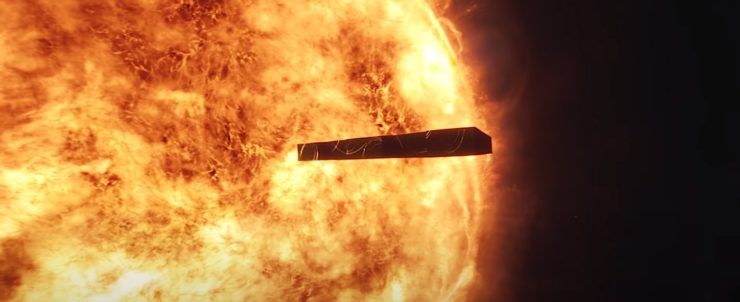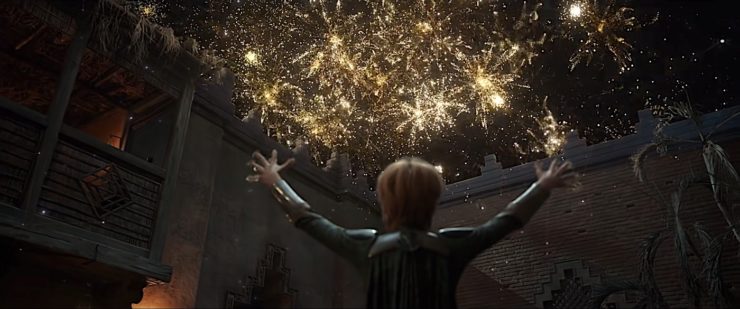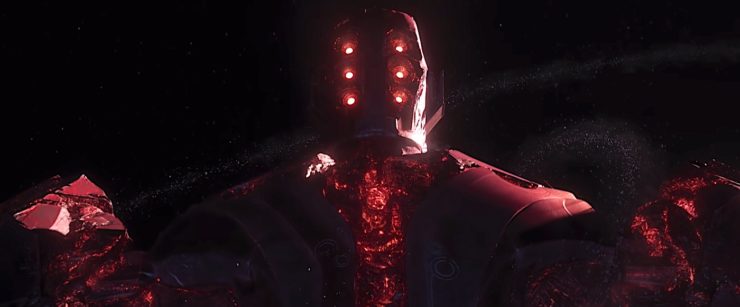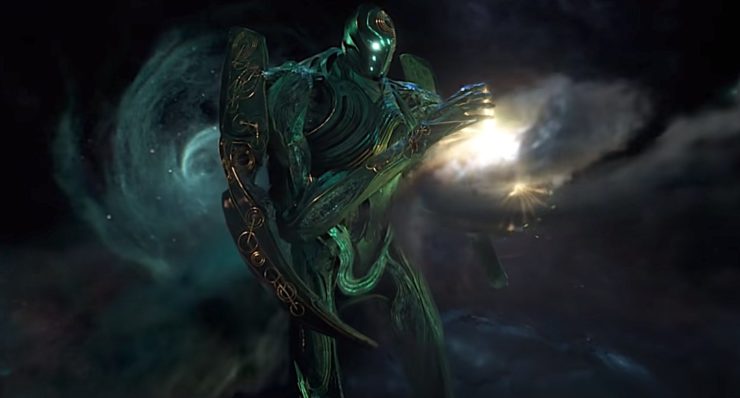First things first: overall, I liked Eternals. (Possibly more than my beloved colleague Emmet?) While I agree that there were creaky bits, some of the dialogue was too stilted, and there was just a bit too much going on, I liked that the movie tried to do something different within the framework of a Marvel movie. I also like Chloe Zhao’s other work quite a bit, and I love the work of one of her major influences, Terrence Malick. (I never thought I’d get to see the spirit of Malick processed through a Marvel filter, so that alone was exciting to me? Now if I get my dearest wish, Martin Scorsese and Marvel burying the hatchet so Scorsese can give us his gritty take on Nightcrawler, I will at last know happiness.) The moment the Eternals meet humanity for the first time is a superheroic riff on Malick’s The New World, just as their ship could be seen as a skewed take on 2001’s Monolith—technological advances arriving hand-in-hand with exploitation, opportunity and adventure carrying suffering in their wake.
But for real, a Marvel movie fueled by ideas was so refreshing? When was the last time that even happened? Underneath all the action and fantastic acting, Black Panther was at heart a conversation between T’Chaka, T’Challa, Nakia, and Eric Killmonger. The intent was to send us out the door debating. If you want to, you can read Netflix’s Daredevil as a conversation about morality and religious faith. The Iron Man trilogy is maybe, somewhat, a conversation about the military industrial complex. Eternals is basically “Let’s Attack and Dethrone God: The Movie,” with a lot of fraught debate about whether that’s the correct thing to do, who gets to decide (deicide?), what the consequences will be, whether humanity is worth those consequences, etc. etc. And maybe your mileage varied, but for me that’s a fun fucking night out at the movies.

In light of that, I thought it might be fun to bounce through some of the more obvious religious imagery the movie plays with, and then to look at the bigger overarching mythos Zhao leaves us with. And then we can debate as much as y’all want.
Why do bad things happen to good people? In a universe where superheroes are real and walk among us, why didn’t anyone step in to prevent genocide, the Holocaust, the nuclear bomb? Taken to a slightly further limb, if you’re a person who subscribes to a religious belief that involves an interventionist god, why didn’t they stop it?
This is why existentialism got so popular in the 1950s. A lot of religious scholars wanted to square their faith or theories or lifetimes of study with a god who would allow the Holocaust, Hiroshima, Nagasaki, millions upon millions of soldiers and civilians dead in Eastern Europe, Russia, China, etc., etc.—you end up with people like Karl Barth, Paul Tillich, and, to some extent, Martin Buber, trying to find a way to keep some version of god, but also to allow for the darkness of the human heart. Some of them went back to Kierkegaard or Schopenhauer. Some threw themselves on the sanctity of free will or the potential of finding meaning in the “Thou-ness” of other people.
Why am I talking about this? Eternals tries to grapple with some pretty high-level shit, and along the way becomes our first existentialist Marvel movie. Our main characters aren’t superheroes, and “Eternals” isn’t a team name like Avengers—it’s what they are. Over the course of the film they learn that the Celestial who created them lied about their true nature and purpose. Essentially, they’re bio-cyborg clones, made not begotten, en masse, that are sent to planets to protect humans from Deviants—and only from Deviants—until the planet is ready for the birth of a new Celestial. The Celestials are fueled by the activity of the humans scurrying around above it, the more technology and growth the better; war encourages technology and growth, thus the Eternals have to hang back whether they want to or not.
Once the Celestial’s ready to break out of the earth like a lizard with an eggtooth, the Eternals are brought back to the World Forge, their memories are removed and stored, and they’re sent on to the next planet believing it to be their first mission. Occasionally some of the memories stick somehow. Any Eternal so afflicted will go “mad weary” as they realize how many genocides and planetary destructions they’ve actually seen, and then, usually, they have to have their minds wiped. Each Celestial is a super powerful sentient being who will go on to create billions of life forms. So is it worth it to sacrifice a planet full of already-existing life for the promise of new stuff? Do the Celestials themselves have an inherent right to live their own lives?
Ant-Man this is not.
The thing that makes this mission different from all other missions is that the mad weary Thena isn’t entirely mind-wiped, and, gradually, multiple Eternals realize their true purpose. They discover that the “Deviants” were also created by Arishem, but got out of his control. Arishem has a plan, but he doesn’t care too much about individual planets, only about their fitness as incubators. It’s like, ummm… only caring about a woman’s health while she’s pregnant (and not caring whether she wants to be pregnant or not), and then losing interest in her needs the moment she’s given birth. In case you’re wondering, there is no consent here—Arishem neither asks for it, nor gives a shit that it isn’t given—which gives us kind of an anti-Nativity story, in the midst of everything else.

The Eternals and the Deviants could somewhat clumsily map onto angels, Nephilim, and/or giants who are talked about in Genesis—ultra-powerful supernatural beings who interfere in human life in positive and negative ways, and could be seen as intermediaries between humans and God. They explicitly inspire the stories of Gilgamesh, Icarus, Athena, Hephaestus, and, per Chloe Zhao, Zack Snyder’s take on Superman. (Fuck it, I’m starting this now: #ReleaseTheKingoCut, i.e. a cut of this film that’s three hours of Kingo and Karun. They’re my favorite.)
The movie plays with interesting imagery in Marvel’s first sex scene, where Ikarus and Sersi make love in a garden that simultaneously recalls Egyptian love poetry (the Egyptians loved writing poetry from the point of view of date palms that were hiding lovers, it’s pretty cool) and the Song of Songs, hands down the sexiest portion of the Hebrew Bible. (I am the rose of Sharon, and the lily of the valleys. As the lily among thorns, so is my love among the daughters. As the apple tree among the trees of the wood, so is my beloved among the sons. I sat down under his shadow with great delight, and his fruit was sweet to my taste. He brought me to the banqueting house, and his banner over me was love. Stay me with flagons, comfort me with apples: for I am sick of love. His left hand is under my head, and his right hand doth embrace me… etc. etc. Thanks, Rabbi Akiva!) And then if we really want to, we can go full Eden with this (though, to be clear, the story of the Garden of Eden is not about sex). because this is the moment when Ikarus starts to care a bit more about people, which leads to his ultimate betrayal of Arishem. He loves Sersi, and Sersi loves people, and it’s her love of people that eventually causes her to go against the will of the Eternals’ god, which, from a certain point of view, she is tempting Ikarus to do as well? And again, there are strong arguments to be made on both sides! But we’ll dig into that more in a few paragraphs.
There’s also a moment where Sprite mocks a proposal to take the humans to space to save them from the birth of the Celestial, with Sprite asking whether they should take two of each animal as well. But… did the Flood happen in some way, in this timeline? Was this a story the humans told each other, or one the Eternals inspired in some way?
And finally, for the other two overtly religious moments: Ikarus and Sersi get married in what seems to be a Hindu ceremony, though that seems more because they happen to be in India when they decide to make things official. Centuries later, when the Eternal Gilgamesh dies in battle, he’s given what seems to be a quasi-Hindu funeral. Karun presides over a riverside bonfire to cremate his body, Karun and Kingo (who has been living as a Bollywood star for over a century by this point) both perform Hindu prayers beside the bonfire, and Thena spreads his ashes over the waters of the Amazon.
Now, as for the Celestial (inside the Earth) himself, his name is Tiamut, and rather than getting turned to marble, he exists in the comics. But for the purposes of the film and this essay, I’m assuming that Tiamut is a riff on Tiamat. In addition to being a monster in Final Fantasy and a five-headed Dragon Queen D&D, Tiamat was a Babylonian goddess—essentially the personification of the primordial darkness of the sea. She gave birth to a pantheon of gods, but when those ingrates murdered her husband, she turned on them; her son Marduk murders her and divides her body into the heavens and the Earth, but not before she gives birth to some last-minute poisonous monsters. (She might have looked like a serpent or multi-headed dragon, hence the D&D inspiration.)
In the book of Genesis, right after God creates the heaven and the Earth, the book goes into more detail about what “Earth” means: “And the earth was without form, and void; and darkness was upon the face of the deep. And the Spirit of God moved upon the face of the waters.” In this instance, you could interpret “the deep” as Tiamat, thus the God of the Hebrews is essentially asserting himself over the primordial goddess of the Babylonians, creating an ordered world where Tiamat rules over darkness and chaos. Or maybe is, herself, darkness and chaos. (Again, this is all pretty fuzzy!) Given that the Eternals’ inspire a ton of mythology, it stands to reason that Tiamut is a riff on the Tiamat that the God of the Hebrews suppressed. That in fact, somehow, humans knew that this terrifying chaos was lurking in the deep beneath the sea. In this iteration, the person who overthrows Tiamut is not the God of the Hebrews, but Sersi.
And about THAT.
When Arishem realizes what’s happened, he goes full Cinerama Biblical Epic with the rumbling clouds and the lightning before appearing over the Earth and collecting Sersi and Phastos and Kingo. Appearing over the earth like that is terrifying, though a post-Thanos Earth seems to roll with the shock way better than I expected. Arishem tells Sersi that he’s not going to punish the humans for the Eternals’ crimes—he’s going to sift through their memories to decide whether they’re right about humanity being worthy of life. Then he’s going to come back for judgment.

SO.
We’ve now got a new timeline. Rather than Thanos gradually collecting stones for the Infinity Gauntlet for his entirely random Snapture, we have Arishem, a creator god but maybe not the creator of humanity (but I’ll come back to that) interpreting non-humans’ memories of human behavior to form an opinion on whether humans are worthy of life, with the plan to come back to earth on his own time with his decision. The humans know nothing of this. They are ignorant of his existence, of their potential fate. This is a riff on the story of Sodom and Gomorrah, in which Abraham and God haggle over the fate of the city, with Abraham initially challenging God to spare the city if there are fifty decent people living there, before gradually talking him down to ten decent people. (Of course, all of Abraham’s excellent intercessory work goes out the window in the next chapter… but let’s hope Eternals 2 skips allll of that.)
But the reason I wanted to write about this in the first place is that Eternals is basically doing a speed run on Gnosticism. The Eternals themselves aren’t losing their religion, because they can’t—they know Arishem is real, that his plan is unfolding all the time. What happens is that some of them decide they don’t agree with it, and begin to fight him.
Now this is a fascinating thing to put in a superhero story.
In the years just before and just after the First Century C.E., the Mediterranean was a bubbling stew of different religious beliefs. There were a couple different takes on Judaism (including a growing messianic movement), a kaleidoscope of “mystery” cults (including the one that worshiped a snake puppet called Glycon that Alan Moore re-popularized… kinda), the Roman pantheon, plain old-fashioned Emperor worship, neo-Platonism, Manichaeism, many different interpretations of what became Christianity, Buddhism (kinda sorta maybe), and beliefs that have come to be grouped under the name “Gnosticism.”
Now you’ll notice I’m hedging the shit out of my statements here, because the problem, or maybe the fun, of talking about this time period is that it’s pretty hazy. A person writing about their own group might exaggerate its size; a person who hated a certain cult might bash it in a piece of writing that is then regarded as canonical centuries later. Once Christianity became the dominant religion other beliefs were, uhh, suppressed, then Christianity fought with itself for centuries (breaking into smaller pieces that, ironically, reflect the early days of the religion far more accurately than I think most people realize), then Islam became the main religion in a lot of these regions, and again, other beliefs were, uhhh, suppressed. (The throughline here is that Judaism, despite being the root of many of these beliefs, is the hackysack of religions, and that fucking sucks.)
The core idea in Gnosticism is that the god that most Jews and Christians (and later on, Muslims) think of as “God” is not actually God. That God is, at best, middle management, and at worst, actively evil. He created our material plane, and rules over it, creating an illusion that this is the best humans can get, and that it’s through the worship of him that they can find happiness. When there’s another God, a better one, who is purely spiritual and exists, moisturized and in its own lane, beyond a series of spiritual realms. The material plane is neither a beautiful world given to humanity by a benevolent creator, nor a veil of sorrows to be fought through to get to Heaven—it’s an illusion and a trap, and humans are pawns in a cosmic game that only some will escape. This creates a dualistic view of life—physical stuff = bad/spiritual stuff = good—in which life is very short-term and matters even less than it does in what would have been considered “orthodox” Christianity.
According to this idea, the story of the Garden of Eden becomes about humans rebelling against God by seeking knowledge, and being punished for that. In some versions, Adam and Eve’s third son, Seth, becomes a savior figure. And a bunch of other religious figures (including, in Christian Gnosticism, Jesus) become emissaries sent from the REAL god, smuggling clues to the plebes stuck on Earth to help them escape the middle manager god, who is often called the Demiurge.
In some versions of Gnosticism, the ultimate God sends out layers of “emanations” coming closer and closer to the physical plane. Sometimes the lowest one is called “Sophia” (“wisdom” in Greek, and yes if I could explain this with Golden Girls clips I would) who might be the one who accidentally created the Demiurge. In this take, the Demiurge stole pieces of Sophia’s essence, and trapped them in the people it created. Actual God retaliated by sending purely spiritual angelic figures (one of whom is called Christ, who essentially wears “Jesus” as a physical shell) on a rescue mission to collect the pieces of Sophia, get them out of the clutches of the Demiurge, and bring them back to the true, purely spiritual reality that exists beyond the physical plane.
Am I making sense? Were they?
You can see why the idea that life is an illusion would appeal to people who lived in a time before antibiotics and painkillers. And why it’d be nice to have the Demiurge as a handy punching bag when things go wrong: rather than God testing you, or Satan tempting you, everything bad in your life becomes the equivalent of Divine Michael Scott forcing you into a teambuilding exercise. But you can also see why this idea would be suppressed once Christianity became the official religion/law of the land, because a whole populace who thinks their physical life doesn’t matter at all is way less likely to raise families, conform to societal norms, give a shit what the emperor wants, etc. And of course, it flies in the face of what was becoming the standardized belief in a Trinity, and a Jesus who was fully human and fully divine. Certain strains of Gnosticism also encouraged their followers to look at the Hebrew Bible, and parts of what were becoming the canonical New Testament, not as infallible scripture but as a con job. Genesis isn’t the story of a miraculous creation, but of a prison, and humanity are not the beloved children of a deity, they’re pawns. A person who learns this truth isn’t supposed to blindly obey the Demiurge—they’re supposed to defy him.

This is why it kept coming back to me as I thought about what Eternals is doing. As I mentioned above, as much as that historic MCU sex scene is Edenic, it also results in Sersi playing the role that a more Gnostic Eve would. Sersi loves humanity, and when she learns the truth of their mission it’s obvious to her that the just path is to fight their god. She thinks she’s giving that knowledge to Ikaris, and she expects him to defy Arishem with her. He, of course, already had the secret knowledge that Sersi has just gained—but he believes the needs of the Celestials outweigh the plebes. He’s #TeamDemiurge, basically. Ikaris ends up caught between his love for Sersi and his faith in his god, and rather than betray either he chooses to leave this world as he entered it: in loving homage to Zack Snyder’s Superman. Kingo believes that Arishem is correct, and that the Celestials have a right to be born, but in an effort to appease both, he removes himself rather than fighting his family. In the end, his attempt at a middle way doesn’t save him, however—he’s snatched from Earth along with Sersi to answer to Arishem. And finally, the other Eternals who side with Sersi are all kind of playing the Gnostic role—having learned the truth, they’re going to fight their creator to try to save humanity.
They’re essentially performing the role that a Seth or a Jesus figure would in a lot of Gnostic stories—going up against the Demiurge to give humanity a shot at a better life. But it’s a little more complicated even than that, because the Eternals have spent their entire 7,000-year-long remembered lives believing in Arishem. Doing everything they do for Arishem, thinking their work was noble, and having faith that they were earning his love. Only to discover that their work was another form of the genocide they recoiled from in the Amazon, that Arishem had lied to them, was using them, that they were pawns just like the humans. For Ajak and Sersi, this was the point where they broke with their faith. Ikaris and Kingo still clung to the idea that Arishem had a plan that was worth working toward. The others seem much happier to bury themselves in life on Earth, to make their own meaning. Phastos explicitly says that Arishem’s purpose for his life is irrelevant compared to the life he’s built with his husband and son.
And really… who created humanity? Was it the Celestials, and if so, do the Celestials owe humanity anything more? Jack Kirby’s comics are very clear that the Celestials created the Deviants, the Eternals, and the Humans. Arishem is explicitly the judge of humanity—his whole deal is that he checks in on people to see if we’re still worthy of the life we’ve been given. But in Zhao’s film, this role as judge only occurs to him after most of the Eternals have thrown in their lot with us, and smothered Tiamut in his crib, so to speak. Because of this, the film seems to be looking at the judgement as a much harsher process, and it also seems to be leaving humanity’s creation ambiguous. Did the Celestials make humans? Or is there something else going on with us, that would inspire the Eternals to do an end run around their own creator to protect us, ala Gnostic cosmology?
I don’t know! But I love that Chloe Zhao made a movie that allows me to think about this stuff. I love that she walked into Kevin Feige’s office and quoted William Blake. And while I didn’t always love Eternals, I love that it tried to do something different.
Leah Schnelbach has seriously crushed a LOT of Gnosticism into two paragraphs, and it’s a very big and unwieldy topic! Apologies if they forgot your favorite Pleroma or whatever. Come I their Thou on Twitter!










